Evan Picone, established in 1949 by Charles Evans and Joseph Picone, carved a niche in women's fashion by seamlessly blending style with functionality. The brand revolutionized professional attire by introducing iconic pieces like the fly-front skirt and tailored pants, catering to women who sought both elegance and practicality during a transformative era. Their innovative designs not only helped shape industry standards but also mirrored significant societal shifts. Collaborations with popular culture figures, such as dressing Mary Tyler Moore, further cemented their influence in the fashion world. As you delve into their rich history, you'll discover how Evan Picone championed craftsmanship and empowered women through fashion, leaving behind a legacy that continues to resonate today.
Company Origins
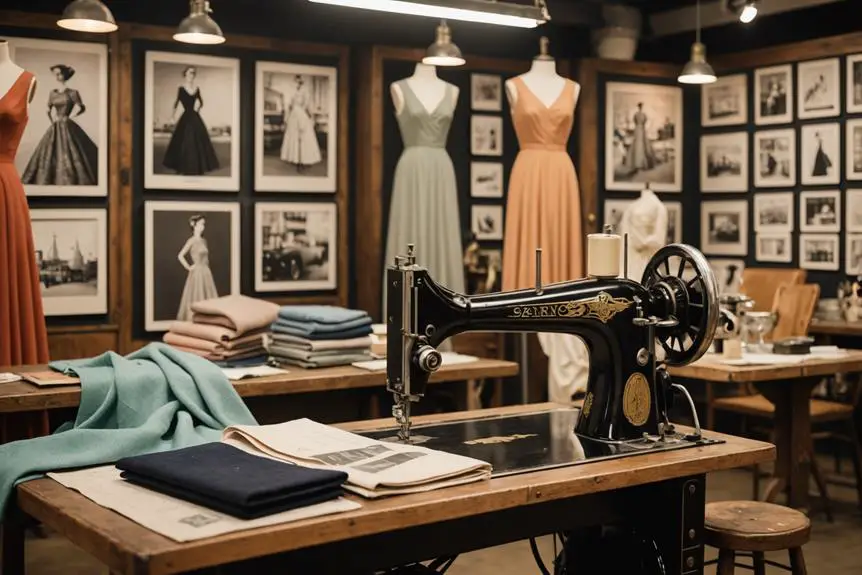
When you explore the origins of Evan-Picone, you uncover a brand that emerged from the vision of co-founders Charles Evans and Joseph Picone in 1949, focusing primarily on women's skirts and slacks. At a time when women's fashion was evolving, they identified a gap in the market for stylish yet functional clothing. Their innovative fly-front design became a hallmark, revolutionizing the way women viewed skirts. This feature not only enhanced aesthetics but also improved comfort and practicality, setting Evan-Picone apart from competitors. Additionally, the brand's commitment to quality and attention to detail mirrored the ethos of other successful heritage brands, such as Eddie Bauer, known for its outdoor apparel and vintage clothing identification resources. Within three years, the brand established its first manufacturing line on Fifth Avenue in New York City, marking a significant milestone in its growth trajectory. The strategic location facilitated visibility and accessibility, helping the brand quickly gain market presence. In 1962, the company caught the attention of Revlon, leading to a lucrative acquisition for $12 million. However, the story didn't end there, as Picone repurchased the company in 1966, demonstrating resilience and commitment to their vision. By dropping the 's' from Evans, they crafted a unified identity that resonated with consumers, solidifying Evan-Picone's place in the fashion industry.
Key Collaborations
Collaboration has played a crucial role in shaping the identity and success of Evan-Picone throughout its history. Founded by the visionary Evan-Picone founder, the brand carved its niche by providing the wardrobe for Mary Tyler Moore's iconic 1970s television show. This partnership established a significant connection to popular culture, positioning the label as a key player in women's fashion.
In the 1980s, Evan-Picone shifted its focus to career women's clothing, reflecting the evolving dynamics of women's roles in the workforce. This strategic pivot allowed the brand to resonate with a new demographic, emphasizing empowerment through fashion. The acquisition by Jones Apparel Group further solidified Evan-Picone's presence, enhancing its market influence through collaborative synergies.
Additionally, collaborations with notable retailers and designers enriched the brand's reputation for quality craftsmanship. The trademarking of Evan-Picone Sport E.P.S. in 1987, despite its cancellation in 1994, signified an effort to diversify and innovate. Each collaboration not only expanded the product line but also reinforced the brand's adaptability in a competitive industry, ensuring Evan-Picone's continued relevance and success across decades.
Iconic Vintage Products
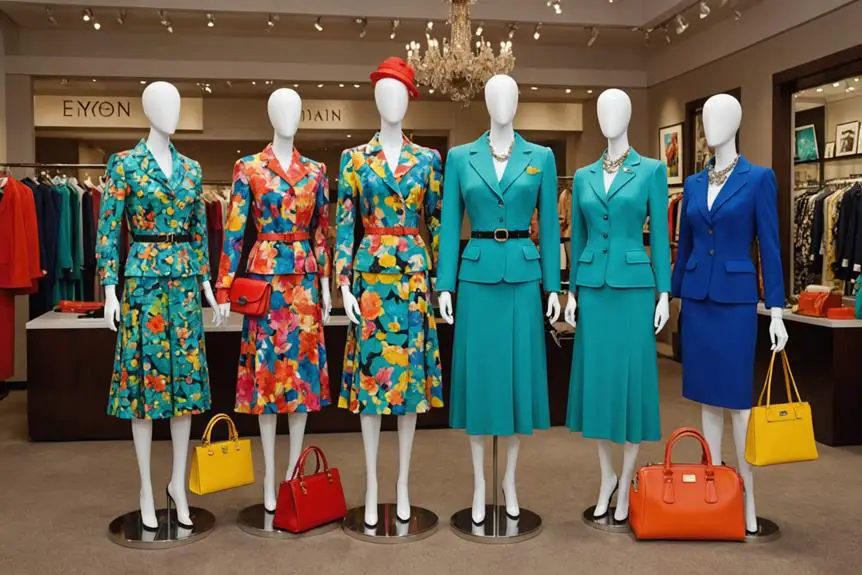
Evan-Picone's iconic vintage products reflect a rich tapestry of fashion evolution, showcasing the brand's ability to adapt and innovate over the decades. The brand, established in 1949, gained recognition for its signature fly-front skirts, an innovation that set a standard in women's fashion. From the 1950s to the 1980s, each era brought unique designs that resonated with the changing needs of consumers, as evidenced by the logo evolution that reflects shifting branding strategies. You can see this evolution through key pieces that defined the brand:
- 1950s Signature Skirts: These featured an innovative fly-front design, setting a standard in women's fashion and becoming a hallmark of the brand.
- 1960s Tailored Suits: Crafted with quality in mind, these suits represented a commitment to stylish yet professional attire for women, reflecting their growing presence in the workforce.
- 1970s Blazers and Blouses: The designs during this time marked a shift toward professional wear, catering to the career-oriented woman while incorporating contemporary trends.
Design Transformation
Transformation in design is a demonstration of the brand's ability to resonate with the evolving landscape of women's fashion. Since its inception in 1949, Evan-Picone has strategically adapted its offerings, starting with the iconic fly-front skirts that laid a solid foundation in women's apparel. By the 1960s, you'd see the brand embrace change by introducing tailored pants, reflecting the growing demand for practical yet stylish womens sportswear.
As the 1980s approached, Evan-Picone pivoted to focus on professional attire, merging classic styles with contemporary trends to meet the needs of career-oriented women. This shift not only showcased the brand's responsiveness to societal changes but also highlighted its commitment to quality craftsmanship. The incorporation of diverse fabrics, like sumptuous velvet, during the 1960s signified a willingness to innovate while maintaining elegance.
Continuing into the 1990s, Evan-Picone's design transformation emphasized modern silhouettes, reinforcing its dedication to timeless style and functionality. This evolution illustrates how the brand has consistently aligned itself with the aspirations of women, ensuring relevancy in an ever-changing fashion landscape while keeping its roots firmly planted in quality.
Industry Influence
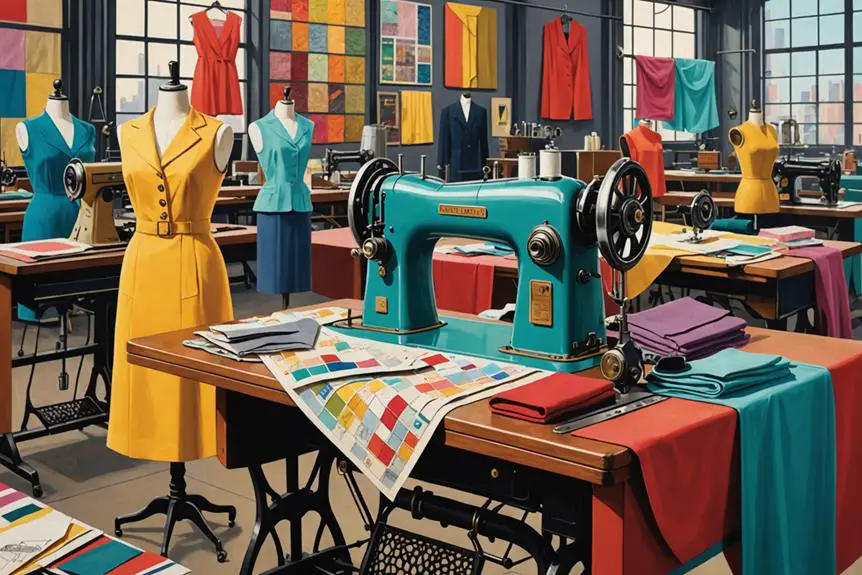
Often regarded as a trailblazer in women's fashion, Evan-Picone considerably influenced the industry by crafting stylish and professional attire that catered to the evolving needs of career-oriented women. In the 1980s, their innovative designs set a new standard, merging quality craftsmanship with contemporary aesthetics. This blend helped define American sportswear and professional clothing, allowing women to express their identity while excelling in the workplace.
Evan-Picone's impact can be highlighted through several key factors:
- Cultural Collaborations: By providing wardrobe for Mary Tyler Moore's television show, Evan-Picone embedded itself in popular culture, elevating its visibility and relevance.
- Democratizing Fashion: The company's pioneering mass production techniques made stylish clothing accessible to a broader audience, breaking down barriers of exclusivity.
- European Influence: Evan-Picone introduced European fashion sensibilities to the U.S. market, enriching the landscape of women's apparel and inspiring countless designers.
In essence, Evan-Picone didn't just create clothing; it shaped the narrative of women's fashion, empowering a generation to embrace style alongside ambition.
Joseph Picone's Background
Joseph Picone's journey from a small town in Italy to co-founding a prominent fashion label exemplifies the intersection of craftsmanship and innovation in the apparel industry. Born in Castronovo in 1918, you'll find that Joseph began his tailoring apprenticeship at just seven years old, honing foundational skills that would serve him throughout his career. By 1936, he immigrated to the United States, where he initially opened a mens trouser business. However, his tailoring expertise soon found a new avenue in women's fashion.
During World War II, Joseph served in the U.S. Army, closing his business during that tumultuous period. Once the war ended, he reopened and became a supplier for Brooks Brothers, further establishing his reputation. In 1949, he co-founded Evan-Picone with Charles Evans, where they focused on innovative women's apparel and pioneered assembly-line production techniques, revolutionizing clothing manufacturing.
Joseph's influence didn't stop there; he remained a crucial figure in fashion until 1983, later introducing the MaxMara clothing line to the U.S. market. His background demonstrates how dedication and adaptability can shape an industry and inspire future generations.
Founding Highlights
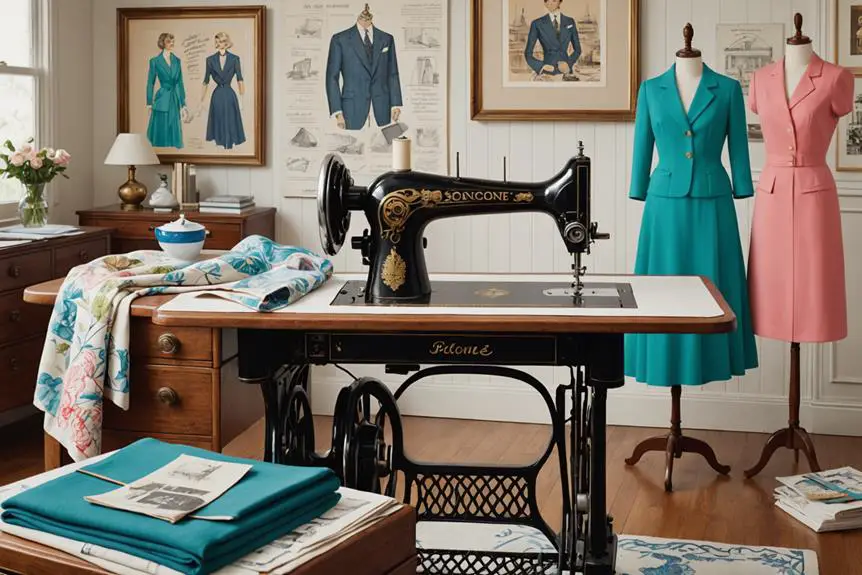
In 1949, the co-founding of Evan-Picone marked a significant moment in the fashion industry, as Charles Evans and Joseph Picone combined their expertise to create a brand that would redefine women's apparel. Initially focusing on women's skirts and slacks, the duo quickly made waves with their innovative designs and production techniques.
Here are three key highlights from the brand's founding era:
- Innovative Design: Within three years, Evan-Picone gained popularity for its fly-front skirt, setting a new standard for women's fashion.
- Pioneering Production: The company introduced assembly-line techniques that revolutionized how women's clothing was manufactured, enhancing efficiency and quality.
- Unified Identity: The name "Evan-Picone" was crafted to sound like a single entity, as Charles and Joseph dropped the 's' from Evans, creating a cohesive brand identity.
Business Evolution
The evolution of Evan-Picone reflects a dynamic journey through the changing tides of the fashion industry. Co-founded in 1949 by Charles Evans and Joseph Picone, the brand initially focused on women's skirts but quickly expanded into tailored pants and professional attire. This strategic pivot laid the groundwork for the company's long-lasting impact. In 1962, Evan-Picone was sold to Revlon for $12 million, marking a significant milestone. Joseph Picone remained at the helm until he repurchased the company in 1966, showcasing resilience and vision.
Throughout the 1970s, the brand gained national recognition, particularly through its wardrobe contributions to Mary Tyler Moore's television show, which cemented its role in American fashion. In the 1980s, Evan-Picone was sold again, this time to Jones Apparel Group, which introduced the Evan-Picone Sport E.P.S. trademark, although it was canceled in 1994. This evolution demonstrates the company's adaptability to the era's fashion trends, shifting from classic sportswear to a focus on professional and career women's clothing. Each ownership change and design shift illustrates how Evan-Picone navigated the complexities of the fashion landscape while maintaining its commitment to quality and style.
Philanthropic Contributions
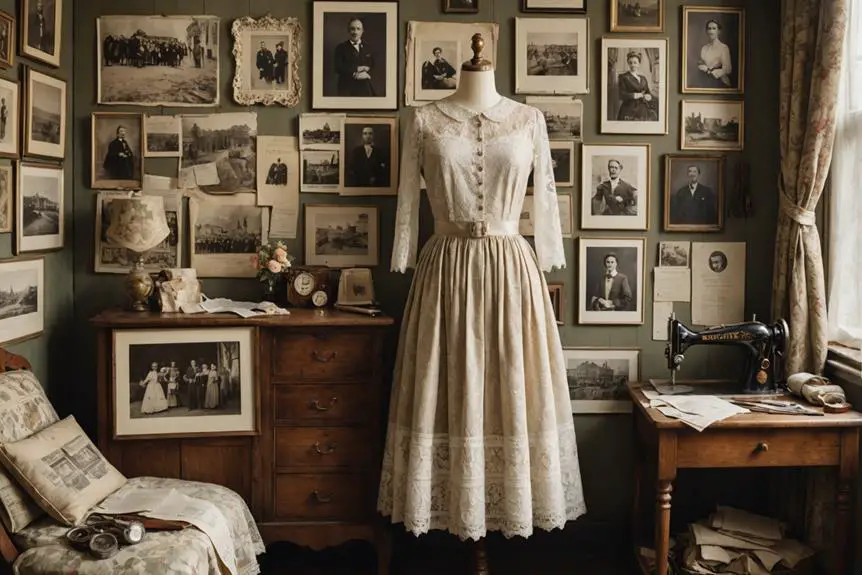
Evan-Picone's journey in the fashion industry is paralleled by a strong commitment to philanthropy, particularly under the influence of co-founder Joseph Picone. His personal experiences fueled a passion for social change, leading him to champion causes that resonate deeply with the community. Here are three key philanthropic contributions that highlight his impact:
- Crusade for Fire Detection: Founded in 1975 after a family tragedy, Joseph Picone advocated for laws requiring smoke detectors in homes, aiming to enhance safety and prevent future losses.
- Alzheimer's Association Leadership: Serving as the national director, Picone raised awareness and support for Alzheimer's research and care, motivated by the loss of his father to the disease in the late 1960s.
- Community Advocacy: His efforts extended beyond specific organizations, reflecting a broader commitment to addressing pressing social issues through advocacy and awareness campaigns.
Joseph Picone's philanthropic legacy not only enhances community safety and health but also underscores the importance of leveraging one's influence for positive change. His dedication serves as a guiding principle for Evan-Picone, merging fashion with meaningful contributions.
Legacy and Commemoration
Joseph Picone's impact on women's fashion is undeniable, as his legacy continues to resonate through the values and aesthetics of Evan-Picone. He pioneered the concept of accessible professional attire, empowering working women to express their individuality while maintaining professionalism. This vision shaped not only the brand but also the broader fashion landscape.
The craftsmanship and stylish designs of Evan-Picone have garnered significant recognition, with many vintage enthusiasts actively seeking out pieces that reflect Picone's innovative spirit. His influence extends beyond Evan-Picone; by introducing the MaxMara clothing line to the U.S. market, he further contributed to the evolution of women's fashion, promoting quality and sophistication.
In vintage fashion communities, the legacy of Joseph Picone is celebrated not just for its historical significance in American sportswear but also for its role in advancing women's empowerment in fashion. Tributes from industry peers and fashion aficionados alike underscore his commitment to quality and innovation. As you explore the world of Evan-Picone, you'll find that Picone's influence is not merely a part of history; it continues to inspire and shape the fashion industry today.
Frequently Asked Questions
How to Tell if Evan-Picone Is Vintage?
To determine if an Evan-Picone piece is vintage, check the tag for intricate embroidery, logo style, and manufacturing details. Look for classic silhouettes and bold lettering, reflecting the design aesthetics of its era.
Who Owns Evan-Picone?
Evan-Picone's currently owned by Jones Apparel Group. This ownership reflects the brand's integration into a larger fashion portfolio, showcasing its adaptability and relevance in an ever-changing market, appealing to diverse consumer preferences.


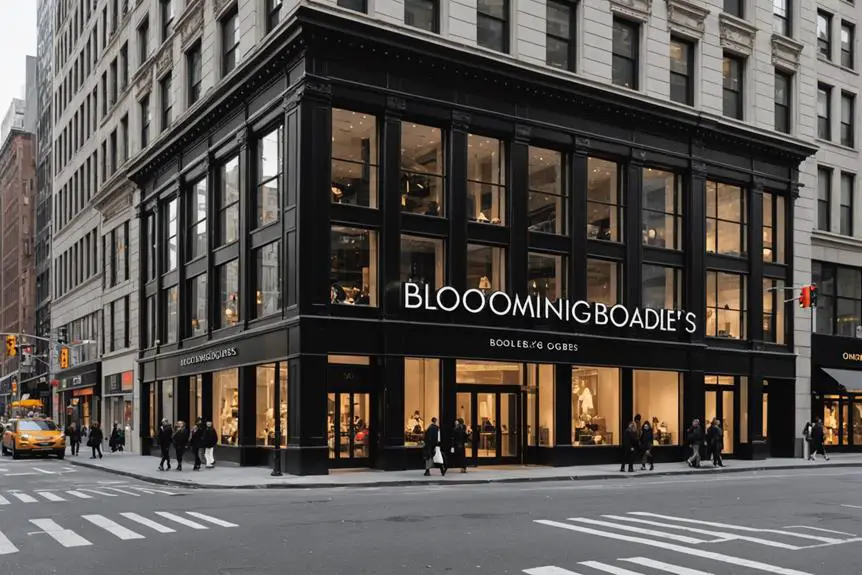
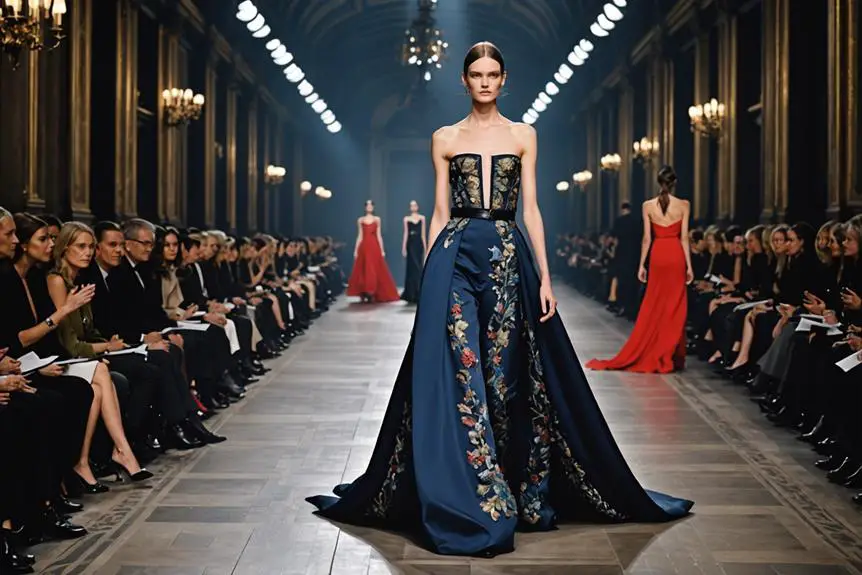
Its such as you read my mind! You seem to grasp a lot about this, like you
wrote the e book in it or something. I believe that you simply can do with a few percent to pressure the message home a little bit, but instead of
that, this is fantastic blog. An excellent read. I’ll certainly be back.
Perfect work you have done, this site is really cool with superb info .